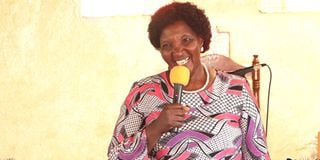Meru female MCAs fortunes decline as only one is elected

Kiirua-Naari MCA-elect Makena Murogocho. She is the only female MCA candidate who won the August 9 contest, a decline from two female MCAs in 2017.
Despite electing its first female governor, Kawira Mwangaza, the fortunes of female Meru county assembly candidates continue to decline.
According to Independent Electoral and Boundaries (IEBC) data, only one woman has been elected to the third Meru County Assembly which comprises 45 elected members.
Ms Makena Murogocho was elected MCA for Kiirua-Naari ward in Buuri after garnering 2977 votes, flooring 17 other candidates. She vied on a Devolution Empowerment Party ticket.
This is a decline from two female MCAs elected in 2017. In 2017, the number declined from five members in the inaugural County Assembly of 2013.
Out of the 569 MCA candidates cleared by the IEBC in Meru this year, 72 were female spread across the county.
The Meru electorate also maintained the 47-year-old trend of not electing a female MP to represent a constituency.
There were 13 female candidates out of 100 cleared to vie for parliamentary seats in the nine constituencies of Meru during this election.
The first and last time a female politician was elected to represent a constituency in Meru was in 1975 when Ms Annrita Karimi won the South Imenti seat.
Unfortunately, Ms Karimi lost the seat after being sentenced to jail term on charges of misuse of school funds where she served as a head teacher.
Speaking to the Nation, Ms Murogocho, who served in the first Meru assembly as a nominated MCA, said more needs to be done to increase female leaders’ appetite for elective seats.
She said her active involvement in community activities and women empowerment initiatives gave her an upper hand in the election.
“I have been working to empower women in my community and in the last five years, I was involved in Twaweza programme. This programme was intended to empower women economically, socially and politically."
"I used to encourage women to vie for political seats. Therefore, I had to lead by example by seeking an elective seat,” she said.
She said more women need to come out and seek votes adding that “we are not just advocating for any woman, but a woman who can perform.”
Meru governor-elect Kawira Mwangaza said female politicians face challenges unique to the gender but it required focus and firmness.
“I have been called names and attempts made to sabotage my campaign but I remained firm. I turned the insults into stepping stones to my victory. This win is an illustration to women that it is possible,” Ms Mwangaza said, adding that her leadership would strive to empower more women leaders.





